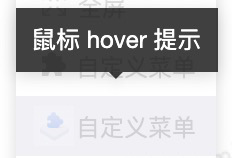Lifecycle
自定义菜单本质上是一个生命周期(Lifecycle)对象, 其接口为:
interface Lifecycle {
bootstrap?: LifecycleBootstrap;
mount?: LifecycleMount;
unmount?: LifecycleUnmount;
update?: LifecycleUpdate;
}例子
// 这是一个自定义菜单
const CustomMenu = {
bootstrap: (props) => {},
mount: (props) => {},
unmount: (props) => {},
update: (props) => {},
}在 Quick BI 中, 自定义菜单与自定义组件的生命周期完全相同, 具体详情请参考自定义组件生命周期。
在大多数情况下,你并不需要关心自定义菜单的生命周期,bi-open-Menu-sdk提供了创建自定义菜单的createBIComponent函数,直接调用即可。
LifecycleProps
LifecycleProps 描述的是传入自定义菜单各个生命周期的 props 参数类型. 包含了 customProps 两个属性, 其接口为:
interface LifecycleProps {
customProps?: MenuComponentProps;
}例子
class MyComponent {
mount(props: LifecycleProps) {...}// props 是 LifecycleProps 类型
update(props: LifecycleProps) {...}
unmount(props: LifecycleProps) {...}
}
const MyReactComponent: React.FC<LifecycleProps> = (props) => <div>...<div/> // props 是 LifecycleProps 类型在 Quick BI 中, 自定义菜单与自定义组件的生命周期属性完全相同, 具体详情请参考自定义菜单生命周期属性。
bi-open-Menu-sdk 提供了创建自定义菜单的 createBIComponent 函数, 并对LifecycleProps进行了封装,并通过 React 的 props 传入,以下统一称其为 menuComponentProps。
menuComponentProps
menuComponentProps 是自定义菜单运行时的一些信息,其接口为:
/**
* 自定义菜单 props 接口
*/
export interface MenuComponentProps {
/** 页面信息 */
pageConfig: MenuPageConfig;
/** 操作 */
dispatch?: MenuComponentPropsDispatch;
/** 自定义菜单展示模式 */
menuMode?: CustomMenuMode;
}menuComponentProps.menuMode自定义菜单展示模式, 可能有以下几种取值:
1- 平铺,直接展示在界面上2- 收起,隐藏至更多下拉框中
在 Quick BI 中, 所有的自定义菜单均会继承 MenuComponentProps
menuComponentProps.pageConfig
代表自定义菜单当前页面信息配置, 其接口为:
interface MenuPageConfig {
/** 工作空间id */
workspaceId: string;
/** 页面id */
id: string;
/** 当前页面展示模式 */
mode: DashboardDisplayMode;
/** 端设备(默认pc) */
device?: 'pc' | 'mobile';
}workspaceId:当前工作空间idid:当前页面idmode:当前页面的模式
preview:查看态, 例如仪表板的查看态edit:编辑态, 例如仪表板的编辑页
pageType:字段类型, 可能有以下几种取值:
REPORT:电子表格PAGE:仪表板
menuComponentProps.dispatch
自定义菜单修改属性或触发行为的函数
(param: {
type: 'openModal' | 'closeModal'
paylpad: any
}) => void参数
param行为类型参数,
param.type共有以下类型:openModal自定义菜单的打开弹窗操作,调用后会唤起弹窗。
此时 =
payload的类型为payload: MenuModalFuncProps,其中MenuModalFuncProps接口定义为:export interface MenuModalFuncProps { /** PC端弹窗宽度 */ width?: string | number; /** PC端和移动端点击取消按钮时的回调 */ onCancel?: (...args: any[]) => any; /** 内容 */ content?: React.ReactNode; /** 标题 */ title?: string; /** PC端点击确定回调,返回 promise 可以延迟关闭。 */ onOk?: (...args: any[]) => any; /** PC端确认按钮文字 */ okText?: React.ReactNode; /** PC端取消按钮文字 */ cancelText?: React.ReactNode; /** PC端确认按钮属性 */ okButtonProps?: { style?: React.CSSProperties; disabled?: boolean | undefined; }; /** PC端取消按钮属性 */ cancelButtonProps?: { style?: React.CSSProperties; disabled?: boolean | undefined; }; }closeModal自定义菜单的手动关闭弹窗操作. 调用后会关闭最近一次唤起的弹窗。
此时无需传入
payload。
menuComponentProps.chart
chart 属性只有在图表卡片下的菜单才会传入,图表的数据字段配置, 其接口为:
export interface MenuComponentChartProps extends MenuComponentProps {
/** 图表信息 */
chart: MenuChart;
}其中 MenuChart 与自定义组件的 customProps 完全相同, 具体请参考customProps。
menuComponentProps.sheets
sheets 属性只有在电子表格的菜单才会传入,图表的数据字段配置, 其接口为:
export interface MenuComponentExcelProps extends MenuComponentProps {
sheets: MenuSheet[];
}其中MenuSheet是电子表格数据,其数据结构是一个数组。
interface MenuSheet {
/** 标签 id */
sheetId: string;
/** 标签名称 */
sheetName: string;
/** 标签顺序 */
sheetOrder: number;
}bi-open-menu-sdk API
createBIComponent
创建 Quick BI 自定义菜单的函数,返回一个自定义组件对象。
(option: IOption) => Lifecycle参数
option
配置参数
interface IBiComponent {
mount?: Interfaces.LifecycleMount<Interfaces.ComponentProps>;
umount?: Interfaces.LifecycleUnmount<Interfaces.ComponentProps>;
update?: Interfaces.LifecycleUpdate<Interfaces.ComponentProps>;
}
interface IBiComponentConstructor {
new (): IBiComponent;
}
interface IOption {
element: IBiComponentConstructor | React.ComponentType
}elementelement 的类型为React 组件
React.ComponentType。
例子
import { createBIComponent } from 'bi-open-menu-sdk'
const MyComponent = (props) => <div>...</div>
const { bootstrap, mount, unmount, update } = createBIComponent({
element: MyComponent,
})MenuItem
bi-open-menu-sdk 提供了一个名为 MenuItem 的 React 组件, 方便开发者开箱即用。
例子
import { Interfaces, MenuItem, createBIComponent } from 'bi-open-menu-sdk';
// 自定义菜单
const MyCardMenu: React.FC<Interfaces.MenuComponentChartProps> = React.memo(props => {
// 点击事件
const handleClick = React.useCallback(() => {
console.log('click');
console.log('props', props);
props.dispatch({
type: 'openModal',
payload: {
title: '我是标题',
content: <iframe src="https://www.yuque.com/u2227425/ia1pn8/nvg5q6" width="100%"></iframe>,
onCancel: () => {
console.log('关闭事件');
},
onOk: () => {
console.log('确认事件');
return new Promise((resolve, reject) => {
setTimeout(Math.random() > 0.5 ? resolve : reject, 1000);
}).catch(() => console.log('Oops errors!'));
},
cancelText: '点我取消',
okText: '前往',
cancelButtonProps: {
style: { display: 'none' },
},
okButtonProps: {
disabled: true,
},
},
});
}, [props]);
return (
<MenuItem
title="自定义菜单"
onClick={handleClick}
/>
);
});
// 导出自定义菜单
export const { bootstrap, mount, unmount, update } = createBIComponent<Interfaces.MenuComponentChartProps>({
element: MyCardMenu,
});其接收属性如下:
interface MenuItemProps {
/** 根元素 className */
className?: string;
/** 根元素 style */
style?: React.StyleHTMLAttributes<HTMLDivElement>['style'];
/** 菜单标题 */
title?: string | React.ReactNode;
/** 菜单禁用 */
disabled?: boolean;
/** hover 提示 */
hoverTip?: string;
/** 是否加载中 */
loading?: boolean;
/** 点击事件 */
onClick?: (e: React.MouseEvent<HTMLDivElement>) => void;
}MenuItem.title
自定义菜单标题
例子
// ...
<MenuItem
title="自定义菜单"
/>效果如下

MenuItem.disabled
自定义菜单是否禁用
例子
// ...
<MenuItem
title="自定义菜单"
disabled={true}
/>效果如下

MenuItem.loading
自定义菜单是否在 loading 状态
例子
// ...
<MenuItem
title="自定义菜单"
loading={true}
/>效果如下

MenuItem.hoverTip
自定义菜单hover文本信息提示
例子
// ...
<MenuItem
title="自定义菜单"
disabled={true}
hoverTip="鼠标 hover 提示"
/>
MenuSchemaItem.onClick
自定义菜单点击时触发事件
例子
// ...
<MenuItem
title="自定义菜单"
onClick={() => {}}
/>MenuItem.showTitle
自定义菜单标题是否展示
例子
// ...
<MenuItem
showTitle={false}
/>MenuItem.showIcon
自定义菜单图标是否展示
例子
// ...
<MenuItem
showIcon={false}
/>